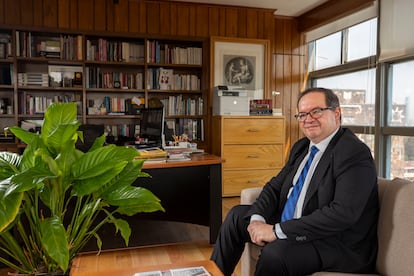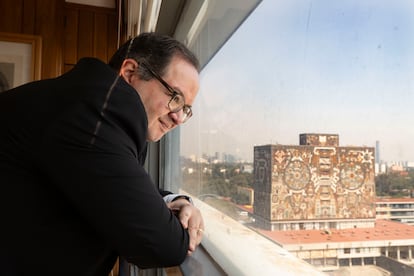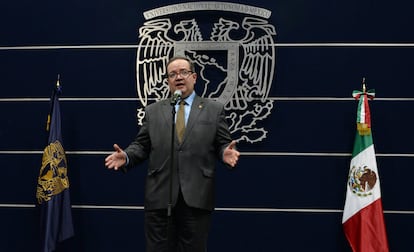Leonardo Lomelí, the prudent leader who became rector of Latin America’s largest university
Described as a great analyst forged in the academic system, the historian and economist — who is taking the reins of the National Autonomous University of Mexico — is also a big fan of his country’s classic films

It was 1989 and Leonardo Lomelí was in his first year in the Faculty of Economics at the National Autonomous University of Mexico (UNAM). Without any papers in hand, he stood in front of an auditorium full of students and teachers, to explain why he should be chosen as the university representative of his class.
“Since then, I’ve seen him do that every year,” recalls his friend and fellow economist Ciro Murayama. “He has a prodigious memory and an incredible capacity for analysis. When Leonardo is going to present a book, he reads it in one shot and comes to the lecture and dives right in.”
Lomelí — who has been outgoing Rector Enrique Graue’s general secretary and right-hand man for the past eight years — took office this past week, replacing his predecessor as the head of the UNAM, Latin America’s largest university. Throughout his entire life, he has demonstrated a clear loyalty to his alma mater.
Those who know him say that Lomelí, 53, is a “creature of the university.” Son of Mrs. Clarita — an art teacher at the high school affiliated with the UNAM — he grew up with the university as a playground. He crossed the city every day, from the borough of Coyoacán, to attend high school in Lindavista, where his mother taught.
Upon entering the Faculty of Economics, he stood out quickly. The prestigious professor José Ayala chose him as his favorite student. He was the one who introduced Lomelí to the man who would become one of his great teachers: Rolando Cordera. “He’s a very easy-going person. [Ayala] brought us together to eat and chat… and he turned out to be a very special guy, not only very bright, but cultured and smart, with a clear vocation for political economy and history. I confess that it attracted attention even then,” the renowned economist tells EL PAÍS. He subsequently appointed Lomelí as his assistant.
During those university years, Lomelí participated in the National Association of Economics Students, an organization that emerged to represent the position of public university students under the presidency of Carlos Salinas de Gortari (1988-1994), also an economist. Between attending lectures by Paul Krugman — who was heading towards stardom — and Nobel Prize-winning Italian economist Franco Modigliani, Lomelí was elected president of the association. “It was a clear sign that he liked to assume positions of leadership and student representation, a reflection of his interest in public and academic life,” explains Gerardo Esquivel, who was deputy governor of the Bank of Mexico and Lomelí's colleague.
Murayama adds: “He wasn’t the typical student leader: he wasn’t an athlete, he didn’t have long hair; he wasn’t an agitator. He was a studious guy who spoke very slowly, but who was recognized for his intellectual capacity among the students. He was already an outstanding leader, he always was.”

A university wedding
A year before finishing his degree in Economics, Lomelí also began studying History. He ended up opting to complete his master’s degree and his doctorate in this field. Both his theses were aimed at studying the history of Mexico’s economic policy, one of his main fields of research.
“I think that’s what he likes most: the economic policy of the [Mexican] Revolution [1910-1920], of reconstruction, of the 19th century. He’s done some very neat things,” says Cordera. The men have written four books together. In total, Lomelí has authored nine books in collaboration and six alone. The first — focused on the history of the city of Puebla — was written just two years after finishing his second degree. His latest — State, Economy and Society in Post-Revolutionary Mexico — will be presented next week at the Guadalajara International Book Fair.
It was his passion for history and economics that led Lomelí to join Cordera in a cafe with the renowned historian Álvaro Matute, in the middle of the university strike in 2000. His love of history was what allowed him to explain to his economics classmates about why certain landmarks in their country — such as the church in the historic center of Mexico City, or the palace in Puebla — are built where they are built. According to his mentor, it’s this “enviable combination” that gives him “the reflexes and strengths — as well as the patience — to deal with the massive, uneven thing that is the UNAM.”
In an interview with EL PAÍS — a week before being elected rector — Lomelí said something similar. “My training as an economist gives me the possibility of understanding what the challenges of the present are, while my training as a historian helps me understand the background of the university. It’s important to know where we come from, so as to better project where we want to go.”
Lomelí never wanted to leave the UNAM. Murayama says that his wedding seemed like “a big college get-together.” There were guests from the departments of Chemistry, Philosophy, Economics and History. “He was always a person surrounded by many people, from very different disciplines. He wasn’t the student who locked himself in the library, he was always very well-read and cultured, but also a big participant in university life,” the economist points out. “He wasn’t a leader of the masses — what distinguished him was his charisma of serene intelligence. That made him very attractive to many colleagues.”
He has knowledge of history, but also about the Golden Age of Mexican Cinema, such as classic films by Luis Buñuel and Sara García. “You’re talking to him and he always refers to a dialogue from some old movie. He’s a man with a sharp sense of humor,” Murayama chuckles. “He’s a very lovable human being,” agrees Lorenzo Córdova, former president of the National Electoral Institute. He also points out that Lomelí has “impressive seriousness,” but also that “it doesn’t take away his sense of humor.”
“He’s a family man, an extraordinary father. For our generation, a strangely cultured man,” Córdova says. In that sense, Murayama points out that “Leonardo was one of the wise men of my generation.”
In 2010, at the age of 40, he ran to be director of the very hectic Faculty of Economics, against two other professors who were 20 years older than him. That was his big leap. He succeeded and was then re-elected. In 2015, he sought to be rector, in the same election as Enrique Graue. He lost, becoming general secretary instead. And, over the past eight years, he says that he has finally gotten to know the university in depth, dealing with the real problems of 400,000 people, including university students, professors, researchers and administrative staff. Becoming rector after this experience only seemed like the natural path.

The last election
This year was the fourth time that Lomelí appeared before the Governing Council of the UNAM. His interview was “wonderful,” according to a member of this board. “He answered absolutely everything. He has a very complete diagnosis of what’s happening at the university… [and] he not only makes a diagnosis, he also offers solutions.”
Some of the phrases that are frequently uttered about the new rector are: “he’s a man who listens a lot, he reflects before answering; he’s absolutely serene, but he’s firm; when he was director of the faculty, we never had a strike; he’s done many things, he’s very efficient.” However, the competition for the job was strong. The secretary of Institutional Development — Patricia Dávila — was the other big contender to lead a university that has never had a female rector. The board didn’t reach an agreement on Tuesday, nor on Wednesday. Meeting every day from 10 a.m. until 7 p.m., the elevator operator in the Rectory Building knew that Thursday was the day. Everyone arrived all dressed up.
Lomelí needed 10 of the board’s 15 votes. He achieved them after several rounds and very tight counts. Hours after he was elected, it was also happily announced that Dávila had been chosen as general secretary. “The university has never had a female general secretary either,” says the same anonymous source from the board, who believes that they’re going to be “the dynamic duo of the university: they’re going to do important things.”
The new rector inherits a problematic relationship that he’s already well-aware of. Soon after he was elected, President López Obrador began criticizing the new university leader: “This new rector is from the group that has dominated the economy, who never opposed the neoliberal economic policy that has dominated for 36 years.”
“There, the president is wrong,” scoffs Gerardo Esquivel, who recalls that, in 2008, alongside Lomelí and Murayama and many former ministers, he participated in a working group that “emerged precisely against neoliberal positions.” On the ground floor of UNAM’s Rectory Building — with coffee, juice and papaya being served — a group of economists warned (before it had properly arrived) of the havoc that the Global Financial Crisis was going to cause.
Those who know Lomelí don’t believe that the president’s accusations will affect him. “He’s a man who knows how to debate, but with great prudence and tolerance. In the times we live in — and those that are yet to come — someone who knows how to argue without becoming confrontational is very valuable,” says Córdova. Lomelí tells EL PAÍS that it seems to him that the tension with López Obrador has more to do with the media than with practicality. Despite his diatribes, the rector notes, the president hasn’t reduced the federal budget which the UNAM depends on.
Murayama remembers how one of the last times that López Obrador visited UNAM was after he was invited by the then-director of the Faculty of Economics. He had been invited to present one of his books. “Leonardo invited him as part of an open dialogue… he’s a man who can converse with all political forces, at a distance, in a very politically turbulent Mexico. He doesn’t avoid any topic. He’s not afraid to raise criticisms: he does so calmly, with intelligence and conviction.”
All the people consulted for this report recognize the strong candidates that competed to become rector of the UNAM this year. Among all the attributes and strengths of the faculty directors, coordinators and senior officials who wanted to replace Graue, Lomelí represents a life by and for the university.
Murayama says: “I remember him in 1990, going up to the third floor of the faculty, loaded down with books, always wearing a sweater, with sweat running down his forehead. And, 30 years later, when he was already general secretary, going up to that same third floor — now to teach a class, now in a suit and tie — but still loaded down with books and with sweat on his forehead. It’s the same guy, just a few years later.”
Sign up for our weekly newsletter to get more English-language news coverage from EL PAÍS USA Edition
Tu suscripción se está usando en otro dispositivo
¿Quieres añadir otro usuario a tu suscripción?
Si continúas leyendo en este dispositivo, no se podrá leer en el otro.
FlechaTu suscripción se está usando en otro dispositivo y solo puedes acceder a EL PAÍS desde un dispositivo a la vez.
Si quieres compartir tu cuenta, cambia tu suscripción a la modalidad Premium, así podrás añadir otro usuario. Cada uno accederá con su propia cuenta de email, lo que os permitirá personalizar vuestra experiencia en EL PAÍS.
¿Tienes una suscripción de empresa? Accede aquí para contratar más cuentas.
En el caso de no saber quién está usando tu cuenta, te recomendamos cambiar tu contraseña aquí.
Si decides continuar compartiendo tu cuenta, este mensaje se mostrará en tu dispositivo y en el de la otra persona que está usando tu cuenta de forma indefinida, afectando a tu experiencia de lectura. Puedes consultar aquí los términos y condiciones de la suscripción digital.









































